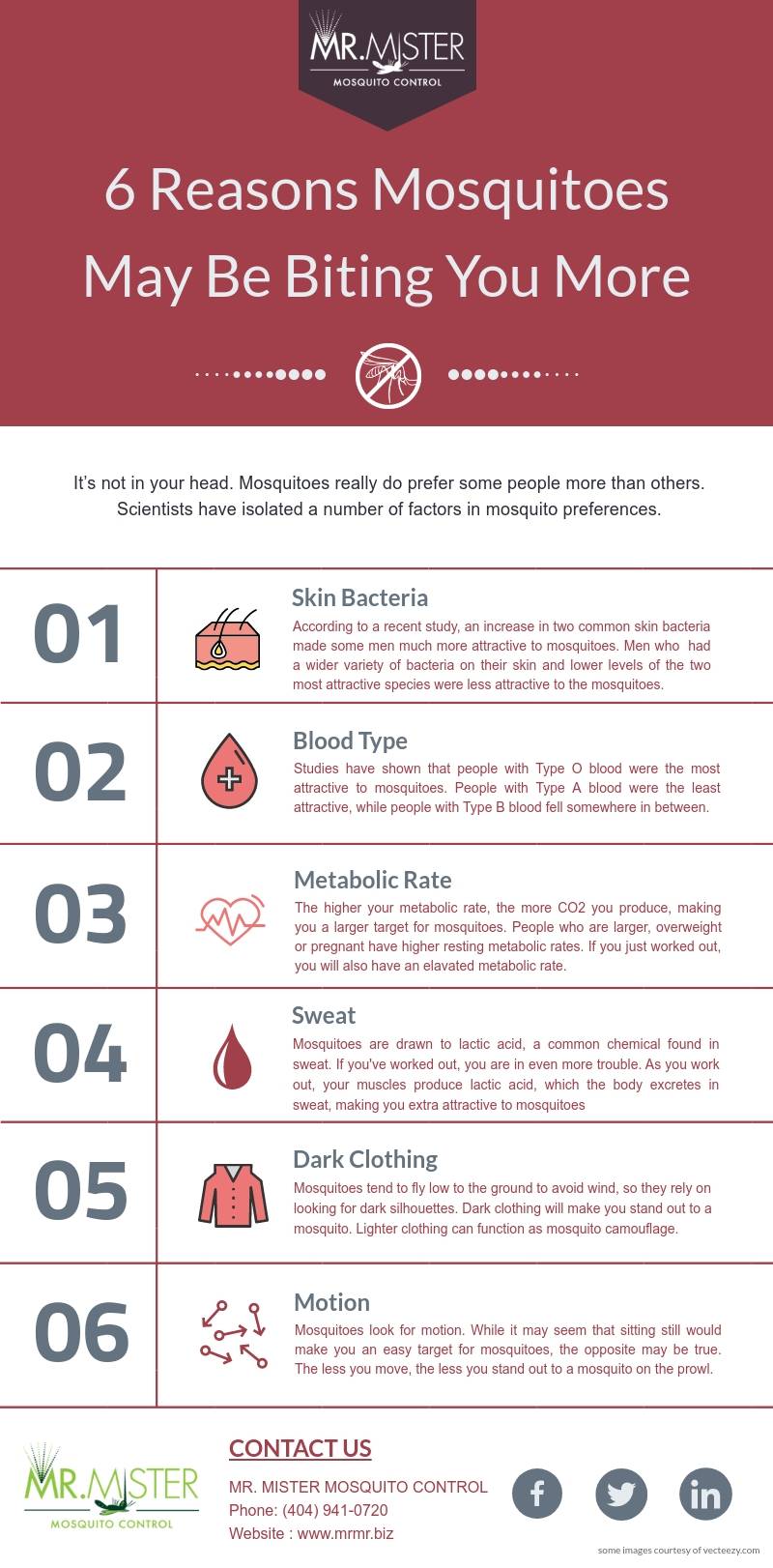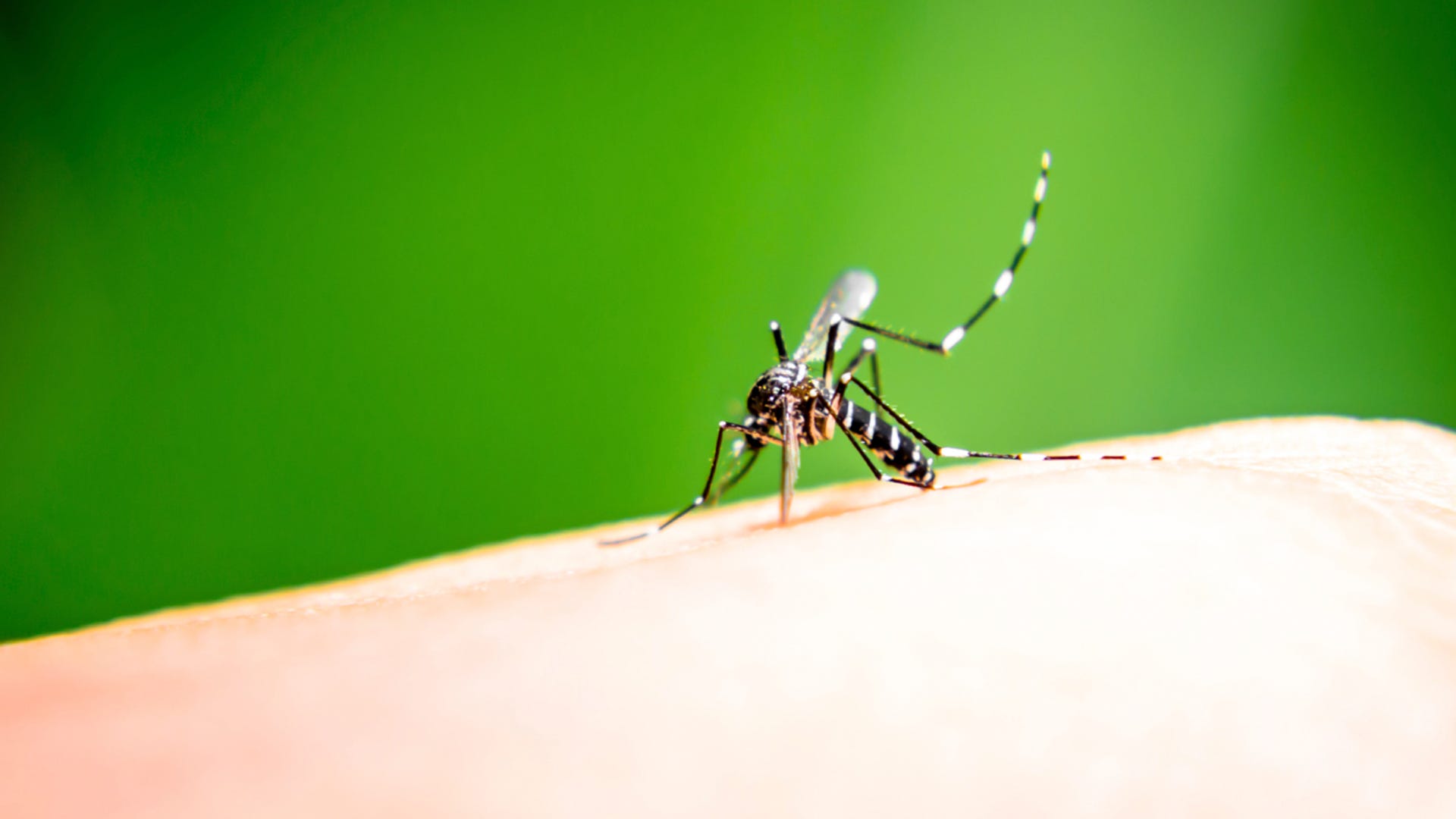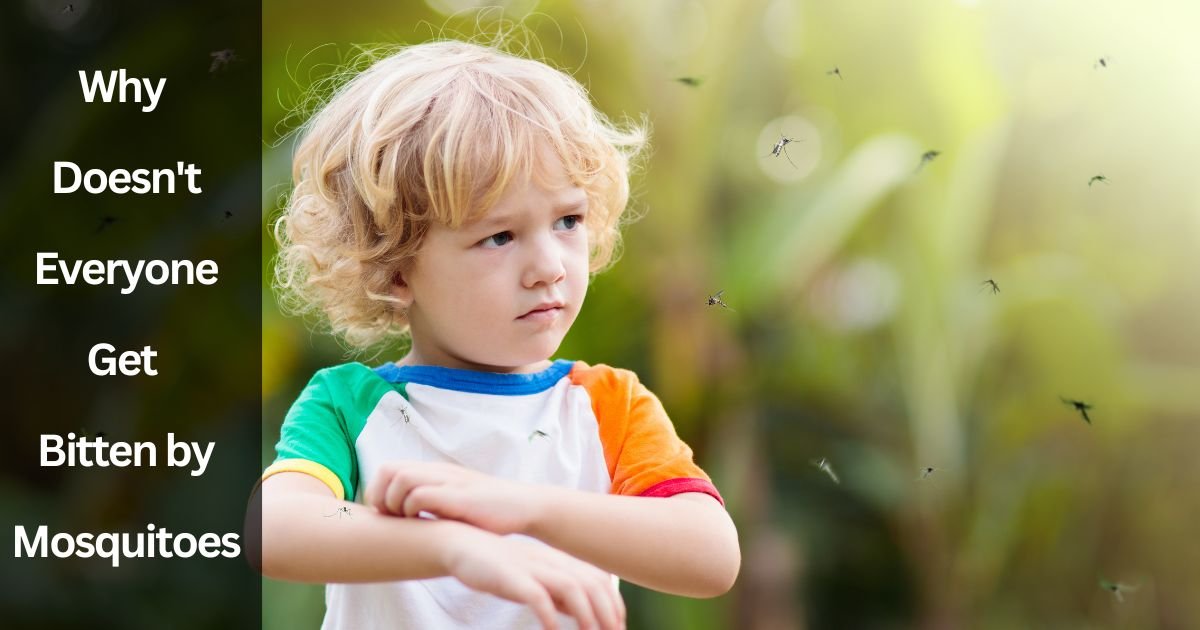Not everyone gets bitten by mosquitoes due to factors like blood type and skin chemicals. Various elements, such as blood type and skin chemicals, play a crucial role in attracting mosquitoes.
In the past, common beliefs linked increased mosquito bites to factors like wearing perfume or consuming salty snacks. However, recent studies have highlighted the significance of genetic factors and bodily substances in determining mosquito attractiveness. Factors such as body odor, skin bacteria, and even clothing color can influence a person’s susceptibility to mosquito bites.
Understanding these dynamics can help individuals take proactive measures to reduce their risk of mosquito bites and potential diseases they may carry.
Introduction To Mosquito Attraction
Understanding why some individuals seem to attract mosquitoes more than others is linked to factors like blood type, skin bacteria, and even sweat composition. Research indicates that certain people emit odors or chemicals that make them more appealing to mosquitoes, resulting in varying bite frequencies among individuals.
Mosquitoes are notorious for their itchy and irritating bites, but have you ever wondered why some people seem to attract these pesky insects more than others? Understanding the factors that influence mosquito attraction can help shed light on this common phenomenon.
Factors Influencing Mosquito Attraction
Several factors contribute to why mosquitoes are more attracted to certain individuals:
- Blood Type: Research suggests that mosquitoes may be more attracted to individuals with type O blood.
- Body Odor: People with a higher concentration of certain chemicals in their sweat, such as lactic acid, are more appealing to mosquitoes.
- Carbon Dioxide: Mosquitoes are drawn to the carbon dioxide emitted by humans when they exhale.
- Body Heat: Mosquitoes are attracted to the heat signatures emitted by warm-blooded animals, including humans.
- Clothing Color: Dark-colored clothing can attract mosquitoes as they are drawn to darker shades.
Common Misconceptions About Mosquito Bites
There are several misconceptions about mosquito bites that have circulated over the years, such as:
- Perfume: Contrary to popular belief, wearing perfume does not necessarily make a person more attractive to mosquitoes.
- Diet: While certain foods like bananas may increase the amount of lactic acid on the skin, there is limited evidence to support that they directly attract mosquitoes.
- Immunity: Some individuals may develop a degree of immunity to mosquito bites over time due to repeated exposure to mosquito allergens.
Scientific Insights Into Mosquito Preferences
Have you ever wondered why some people seem to attract mosquitoes more than others? The answer lies in the scientific understanding of mosquito preferences. Researchers have identified various factors that influence a mosquito’s choice of target, including genetics, blood type, and chemical cues emitted by the human body.
Role Of Genetics In Mosquito Attraction
Genetics play a crucial role in determining an individual’s attractiveness to mosquitoes. Studies have revealed that certain genetic factors can make some people more appealing to these pesky insects. The presence of specific genes can influence the production of odors and chemicals that either attract or repel mosquitoes.
Impact Of Blood Type On Mosquito Bites
Research has shown that mosquitoes exhibit a preference for certain blood types. Individuals with type O blood are found to be more susceptible to mosquito bites compared to those with type A, B, or AB blood. This preference is attributed to the distinct chemical markers present in different blood types, which influence a mosquito’s feeding behavior.
Chemical Signals And Mosquitoes
Mosquitoes are attracted to their hosts through a variety of chemical signals. These signals include body odor, sweat, and carbon dioxide, which play a significant role in luring mosquitoes towards their targets. Understanding the importance of these chemical signals can shed light on why not everyone gets bitten by mosquitoes.
Importance Of Body Odor In Attracting Mosquitoes
Body odor is a key factor in attracting mosquitoes. Each person has a unique body odor determined by their genetics, diet, and personal hygiene. Mosquitoes are drawn to specific compounds present in body odor, making some individuals more attractive to mosquitoes than others.
How Sweat And Carbon Dioxide Lure Mosquitoes
Sweat contains various chemicals that mosquitoes find appealing. When we sweat, these compounds are released, acting as a signal for mosquitoes to detect and follow. Additionally, the carbon dioxide we exhale serves as a strong attractant for mosquitoes. They can sense carbon dioxide from a distance, helping them locate their next blood meal.
:max_bytes(150000):strip_icc()/6593887741_e9c4ff264c_k-d8c733fe94ba4f07ab1b7dd425df41ec.jpg)
Credit: www.verywellhealth.com
Environmental And Lifestyle Factors
Factors such as blood type, skin chemicals, and genetics determine why mosquitoes bite some people more than others. Mosquitoes are attracted to certain scents, carbon dioxide levels, and even sweat, making individuals more susceptible to bites based on their unique biological makeup.
Influence Of Clothing And Color On Mosquito Behavior
The color of your clothes can affect your likelihood of getting bitten by mosquitoes. Mosquitoes are attracted to dark colors, especially black and navy blue. Wearing light-colored clothing can help you avoid mosquito bites. Additionally, loose-fitting clothes can reduce the chances of getting bitten as they make it more difficult for mosquitoes to land on your skin.
Effects Of Alcohol And Diet On Mosquito Attraction
Believe it or not, what you eat and drink can impact your susceptibility to mosquito bites. Eating salty foods or consuming alcohol can increase the amount of lactic acid your body produces, which makes you more attractive to mosquitoes. On the other hand, consuming foods high in vitamin B1, such as garlic and onions, can help repel mosquitoes. There are several environmental and lifestyle factors that can influence your likelihood of getting bitten by mosquitoes. Mosquitoes are attracted to warm bodies, so people who exercise or spend time outdoors are more likely to get bitten. Additionally, living near standing water or in areas with high humidity increases your risk of mosquito bites. Using insect repellent and wearing protective clothing can help reduce your chances of getting bitten by mosquitoes.
Physical And Biological Influencers
Various factors influence why not everyone gets bitten by mosquitoes. These include blood type, skin chemicals, and genetic makeup, determining attractiveness to mosquitoes. Studies suggest that certain individuals emit scents or chemicals that repel mosquitoes, making them less likely targets for mosquito bites.
How Pregnancy Affects Mosquito Bites
Pregnancy is a time when a woman’s body goes through many changes, including an increase in body temperature and metabolic rate. These changes make her a more attractive target for mosquitoes. Additionally, pregnant women exhale more carbon dioxide, which is one of the primary cues that mosquitoes use to locate their prey. Mosquito bites during pregnancy can pose a risk to both the mother and the baby, as they can transmit diseases such as Zika, dengue, and chikungunya. Therefore, pregnant women should take extra precautions to protect themselves from mosquito bites.
The Role Of Skin Bacteria In Mosquito Appeal
Mosquitoes are attracted to the bacteria that naturally live on our skin. Some types of bacteria are more appealing to mosquitoes than others, which can explain why some people are more prone to mosquito bites than others. Researchers have found that people with a greater diversity of skin bacteria are less attractive to mosquitoes. In contrast, people with certain types of bacteria on their skin are more likely to be bitten by mosquitoes. Therefore, maintaining good skin hygiene and using products that promote a healthy skin microbiome may help reduce mosquito bites.

Credit: www.mrmr.biz
Preventive Measures And Protection
Mosquitoes are notorious for their itchy and irritating bites, but not everyone seems to attract these pesky insects. While some individuals may find themselves constantly swatting away mosquitoes, others may hardly notice their presence. Understanding the factors that contribute to mosquito bites can help in implementing preventive measures and protection.
Effective Repellents And Their Ingredients
When it comes to protecting yourself from mosquito bites, using effective repellents can make a significant difference. Look for products containing DEET, picaridin, IR3535, or oil of lemon eucalyptus. These ingredients are known to be highly efficient in repelling mosquitoes and reducing the risk of bites.
Behavioral Changes To Reduce Mosquito Bites
Aside from using repellents, making simple behavioral changes can also help in reducing the likelihood of mosquito bites. Avoid spending time outdoors during peak mosquito activity, which is usually during dawn and dusk. Wear long sleeves and pants to minimize exposed skin, and consider using mosquito nets when sleeping in areas with high mosquito populations.
Global Research And Studies
Key Findings From Recent Mosquito Studies
Recent mosquito studies have revealed key findings regarding the factors that make individuals more or less attractive to mosquitoes. These studies have highlighted the role of genetic factors, blood type, and skin chemicals in determining a person’s susceptibility to mosquito bites. Additionally, ongoing research is shedding light on the specific mechanisms through which these factors influence mosquito behavior.
Ongoing Research On Mosquito Behavior And Prevention
Ongoing research on mosquito behavior and prevention is crucial for developing effective strategies to mitigate the impact of mosquitoes on human populations. Scientists are exploring various aspects of mosquito behavior, such as their attraction to certain individuals, as well as developing innovative methods for mosquito control and bite prevention. This research aims to provide valuable insights that can inform the development of targeted interventions to reduce mosquito-borne diseases and minimize the nuisance caused by mosquito bites.

Credit: www.mosquitomagnet.com
Implications For Public Health
Understanding why not everyone gets bitten by mosquitoes is crucial for public health. Factors such as blood type, skin chemicals, and genetic makeup influence mosquito attraction, impacting disease transmission risks. By studying these variations, public health measures can be tailored to reduce mosquito-borne illnesses effectively.
Understanding The Link Between Mosquitoes And Disease Transmission
Mosquitoes are vectors for various diseases such as malaria, dengue, Zika virus, and West Nile virus. Understanding the link between mosquitoes and disease transmission is crucial for public health. Mosquitoes can transmit diseases when they bite and feed on the blood of humans, spreading pathogens from one person to another. This makes mosquitoes a significant public health concern.
Strategies For Community Protection And Awareness
Implementing effective strategies for community protection and awareness is essential in controlling the spread of mosquito-borne diseases. Community education programs can raise awareness about preventive measures such as using insect repellents, wearing protective clothing, and eliminating breeding sites. Public health authorities can also implement mosquito control programs to reduce the mosquito population and minimize the risk of disease transmission.
Frequently Asked Questions
Why Do Some People Not Get Bitten By Mosquitoes?
Certain factors like blood type and skin chemicals influence why some people are not bitten by mosquitoes.
Are There People Immune To Mosquitoes?
Some individuals are more attractive to mosquitoes due to factors like blood type and skin chemicals.
What Blood Type Do Mosquitoes Prefer?
Mosquitoes prefer Type O blood over Type A, B, and AB. Blood type plays a significant role in attracting mosquitoes.
Conclusion
Various factors like blood type and skin chemicals determine mosquito attraction. Immunity and genetic makeup also play a role in why some people get bitten more. Understanding these factors can help in developing effective mosquito bite prevention strategies. Stay informed and protected!
Related posts:

I’m MD Tanvir, and I bring years of expertise gained from working closely with pest control companies to the forefront. My journey in the industry has inspired me to launch Bug Battler, a platform aimed at equipping people with the know-how to combat pests autonomously. Through Bug Battler, I aim to empower individuals with practical insights to tackle pest infestations effectively.

